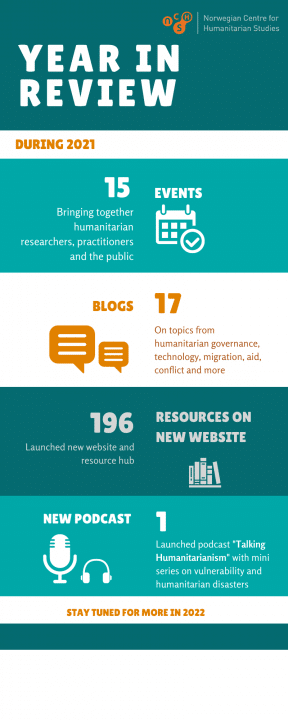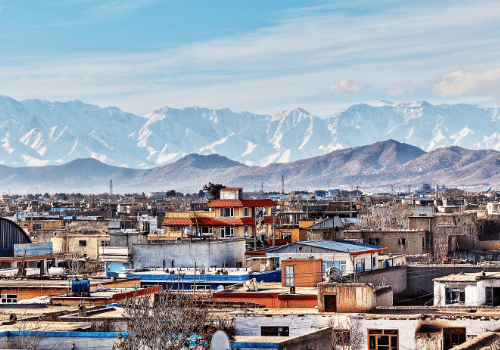 The beginning of 2021 saw the management of the NCHS move from the Peace Research Institute Oslo (PRIO) to the Chr. Michelsen Institute (CMI) for the first time. With this, we welcomed our new Director, Antonio De Lauri, who took over from Maria Gabrielsen Jumbert, following four years of successful leadership.
The beginning of 2021 saw the management of the NCHS move from the Peace Research Institute Oslo (PRIO) to the Chr. Michelsen Institute (CMI) for the first time. With this, we welcomed our new Director, Antonio De Lauri, who took over from Maria Gabrielsen Jumbert, following four years of successful leadership.
This year we have seen the NCHS Research Network on Humanitarian Efforts continue to grow as a platform for connecting humanitarian researchers, practitioners and students in Norway and beyond and for facilitating discussion and exchange on humanitarian related issues.
A key achievement for the NCHS this year has been the launch of our new website and resource hub. We have published 17 blogs this year on a variety of topics from humanitarian governance, technology, migration, aid, conflict and more. We would like to thank all of those who have contributed their insights to our blog. If you are interested in contributing to the NCHS blog for 2022, we encourage you to submit your humanitarian related blogs via our website.
This year we also launched the NCHS podcast, “Talking Humanitarianism”. The first mini series was hosted by Ekatherina Zhukova, Researcher at Lund University. Zhukova discussed the intersecting vulnerabilities of humanitarian disasters with her guests, including anthropologists, humanitarian researchers and practitioners.
We have also published two papers in our new NCHS paper series, the first by Emilio Guida on the use of satellites in humanitarian contexts and the other by Altea Pericoli examining the Organization of Islamic Cooperation and the Islamic Development Bank and the regional dimension of humanitarian diplomacy. Stay tuned for more in 2022!
The events that unfolded in Afghanistan in August and that saw the Taliban take control have clearly had a significant impact on the Afghan people. These events have also shaped the recent work of the NCHS and humanitarian agendas more broadly.
The NCHS hosted events and shared a number of publications related to the situation in Afghanistan. This included a webinar on the paradoxes of protection in Afghanistan, which brought together a prominent panel of experts to discuss the impacts of the emergency humanitarian evacuations and the unprecedented abandonment of digital devices and biometric data. Panelists also discussed the flow on impacts for resettlement and the future of humanitarian assistance. If you missed the webinar, you can view a recording of the discussion here.
CMI Researchers, Arne Strand and Astri Suhrke have also written on recent events in Afghanistan, including two NCHS blogs, “Afghanistan: Beyond humanitarian relief” and “Do not abandon the Afghan people“. NCHS Director Antonio De Lauri has also provided commentary on the situation in Afghanistan in his latest NCHS blog on “The evacuation of judges and the future of justice in Afghanistan.”
This year the theme of our NCHS Annual Meeting was also drawn from events in Afghanistan and the 20 year anniversary of the 9/11 terror attacks. Panelists at the Annual Meeting discussed humanitarian protection 20 years into the ‘global war on terror’ and the implications of counterterrorism measures for humanitarian efforts.
2021 also marked ten years of war in Syria. The NCHS co-hosted a webinar with the Norwegian Red Cross and PRIO looking at the factors driving the war in Syria and the ongoing humanitarian consequences. Panelists also discussed how Norway can leverage its seat on the UN Security Council to influence developments towards peace.
Migration policies in Europe and neighbouring regions have continued to be a topic of discussion in 2021, and NCHS associates have contributed to the debate. NCHS Co-director Maria Gabrielsen Jumbert together with Ayşe Bala Akal for example wrote on the topic of EU off-shore asylum processing and why looking to the Australian model is not a way forward.
Just as in 2020, the global Covid-19 pandemic continues to lead to humanitarian challenges across the world. NCHS Co-Director Stein Sundstøl Eriksen argued in his blog “Vaccine nationalism and vaccine diplomacy: Vaccine distribution and the global south” that responses to the pandemic and to vaccination have been driven by national interests rather than global cooperation and solidarity. In April, the NCHS also hosted a webinar exploring the humanitarian challenges of the corona crisis, including the challenges faced by aid agencies in addressing the pandemic at the local, national and global levels.
This year the NCHS hosted or co-hosted 15 events, and as with the previous year, the majority of these events were held digitally as a result of the ongoing pandemic.
One of the most well-attended online events this year was our webinar with University Professor Michael Barnett from George Washington University on the dimensions of power in humanitarian contexts, including the role of the technology, large corporations and localisation. Here Barnett discussed his idea of a ‘humanitarian club’ and why despite the pledge to ‘localise’ humanitarianism, there has been little shift in power from international to local actors. You can watch a recording of this webinar here.
If you missed any of our events, please head to our events page where you can find recordings of most of our previous events.
As we enter the new year, the NCHS will continue engaging with academics, practitioners, policy makers and the broader public on questions related to humanitarianism and will continue to bridge practical and analytical knowledge.
The Research Council of Norway has also awarded funding to projects related to humanitarianism starting soon, including a project on the ethics of humanitarian negotiation, “Red Lines and Grey Zones: Exploring the Ethics of Humanitarian Negotiation”, led by NCHS Deputy Co-Director Kristoffer Lidén from PRIO and in association with the NCHS. We look forward to seeing this project progress in 2022.
Stay tuned and follow our web page and social media channels on Facebook and Twitter for more of what is to come from the NCHS in 2022, including events and publications. You can also subscribe to our newsletter for news directly to your inbox.
We look forward to engaging with you again next year!
